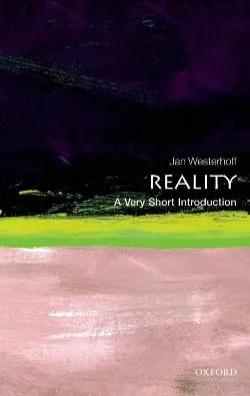
This is an interesting little book about reality, obviously. It’s in the title, after all. But, this is such a staggeringly complex topic, and I was pleased that the author was able to do such justice to it in so few words.
The chapters make logical sense. The first chapter, on dreams and simulations, deals with questions like “are we dreaming?” “are we in a simulation?” “how do we know that we’re not just a brain in a vat?” This sort of thing. The short answer to all of them is, no clue.
The second chapter asks if the material world is real. He offers a few definition for whether things are real. The five working definitions are “
Reality is what I perceive and experience. Basically, reality can be boiled down to my subjective experience.
Reality is what a large enough group of people perceives and experiences. This makes room for states, stock markets, cultural norms, and other such spooks.
Reality gives off resistance. Now, material objects themselves become real when put in contact with subjective experience. For example, I know this bed is real because I don’t tumble to the floor as I lay on it.
Reality is what exists if there are no people. The earth, the moon, and trees falling in a forest would still exist even if there weren’t people. Maybe.
Reality is that which is essential. In other words, reality is quanta or whatever lies beneath it. If this is what reality is, we might not even have a starting point.
So, chapter 2, is the material world real? It depends on which definition of reality you follow, but we really don’t know.
Chapter 3, is the self real? Or, am I real? We also don’t know. This chapter threw me for a loop, and I’m still reeling from it. Descartes’s “cogito ego sum” looks sophomoric in light of the material here. I have no idea if I exist, but the discussions of consciousness are fascinating.
Chapter 4 is the most orthodox in light of Einstein’s general and special theories of relativity. Is time real? I’m going to have to say, I don’t know.
Sometimes, I feel myself questioning the order of things, and this book is a nice reminder that I’m not severely mentally ill. Or, perhaps I am, but, if so, I’m in good company.
In any case, I’m stuck feeling like there SHOULD be solid ground to stand on, but I’m stuck swimming over the Mariana Trench. If I drown, at least I know I won’t be the only one.
Edit: I just remembered there’s a discussion in Chapter 3 about a thought experiment where a person is asked to observe quantum phenomena, but there’s a gun pointed at his head. There’s a 50/50 chance what the observed will be. One of those possibilities is associated with survival, one with being shot through the head. If the branching timelines theory is true—where every action leads to branching timelines—the observer will experience a 100% chance of survival every time. This is because, by nature of existing, we haven’t taken the path of dying (the observer wouldn’t be able to experience dying because it’d be instantaneous).
But, for someone watching the experiment, they’d see half of all observers get shot in the head. Bleak.
I know that the rules of the quantum world are different from the macroscopic world (or, it seems that there is a divide between the IR/UV scale of physics—there was an article in Quanta Magazine about the incompatibility between general relativity and quantum mechanics that covered this ground IIRC), but I wondered if the fact that I’m alive is attributable to this fact. Maybe I died many other times on the way, but those timelines branched off.
Perhaps more eerily, does anyone ever actually experience death? How do we know that—in each timeline—our own subjective experience does not live forever? Surely there’s some minuscule probability that allows for this. I don’t know how to make this thought clear. Someone should have a real life conversation with me and we can tease it out.